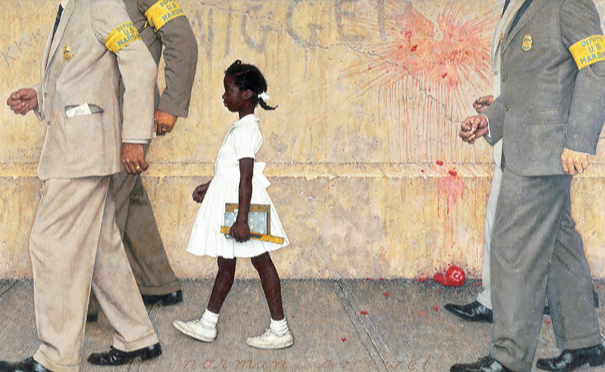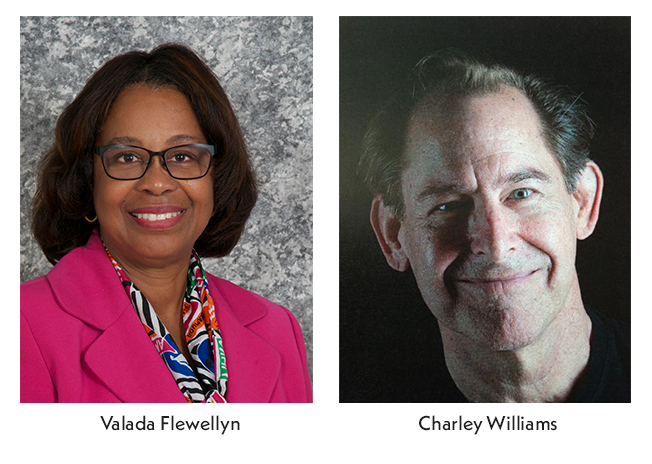Juneteenth - Celebrating with Personal Pledges
Valada Flewellyn and Charley Williams / June 19, 2020
Skin on the Rope
by Valada Flewellyn
We all have skin on the rope
Whether a neck on the rope
Or a hand on the rope
We all have skin on the rope
The pain of that connection
Grips us, entangles us
Compels us to examine
Our history, then construct
Tomorrow to manifest the
Wounds that need
More than a band-aid
Wounds that warrant more
Than a cursory examination
We must dissect the
Fibers of our history
Inspect our suspect
Moral Consciousness
Which allows sin to fester
As we turn our heads
Away from the atrocities
That grab our children
Drowning them in the muck
Of our making
Leaving them unprepared
Unprotected but infected
Generation after generation
From our refusal to acknowledge
How we have Failed
Our children . . . All
We ALL have skin on the rope.
January 28, 2020
Crafting Our Pledges
Ending systemic racism starts with taking responsibility. Each of us must craft his or her own pledge, beginning with the word “I.” Valada and I encourage WP Voice readers to craft their own pledges. We will begin the conversation by giving you ours.
Charley Williams’ Pledge:
I commit to learning more about the root causes of racism, how it spreads, how I enable it and how it is incorporated into life-damaging policies on things like voting, education, access to health care and mass incarceration. I will listen. I will call out racial bias when I see it. It starts with me.
Charley Williams, Voting Advocate
Valada Flewellyn’s Pledge:
I pledge to support my white neighbors, colleagues, friends and family who are courageous enough to pledge themselves to ending racism in this country. I pledge to listen to, to pray, not to hold either the white race or my own race harmless for how long we have allowed this evil to exist in our society to the detriment of our children.
Valada Flewellyn, Poet
Addressing Our Past
First, It is imperative that we address past atrocities, which have for too long been swept beneath the rug of history — Wilmington, NC (1898), Ocoee, FL (1920), Tulsa/Greenwood, OK (1921), Rosewood, FL (1923), Groveland, FL (1951). The Equal Justice Institute’s (EJI) research shows that over a 73-year period, from 1877 to 1950, more than 4,000 racial lynchings were conducted in the South. That’s the equivalent of one lynching per day for 11 years. Enough.
We Need to Know Our Own History
The outrage is real and deep. Up until 1950, only whites could vote in a City of Orlando primary election, which was controlled by a Florida Democratic Party organization called the ‘White Voters Executive Committee.’
Our single biggest challenge is that we don’t know our own history. It’s time to face it.
This history belongs to every one of us. No one can escape. The horrific legacy of lynching and racial terror continues to haunt and plague us. White people have constructed and maintained this centuries-old institutionalized racism; therefore, it only makes sense that, with the help and cooperation of our black friends and neighbors, the whites must shoulder the brunt of the burden of dismantling it. But no one community can do this alone. We all need help from one another.
We must face our shadow stories, state our personal pledges, encourage and engage in the “courageous conversations.” Please join us now as we learn to listen, strive to learn and learn to act. Together, we can create a future that is our gift to our children and our grandchildren.
Valada Flewellyn is a poet and the author of “For the Children: The History of Jack and Jill of America, Incoporated.”
Charley William is past President of the Orange County League of Women Voters.
Flewellyn and Williams are Founding members of Alliance for Truth and Justice, a volunteer group started in 2015 to research the Ocoee Voting Day Massacre of 1920, in cooperation with the Equal Justice Initiative, headquartered in Montgomery, Alabama. More at www.ocoeemassacre.com



I would like to join with you.
This really made me sit up and take notice. I am pained daily now by the new (to me) revelations about the sins of slavery that my white countrymen have inflicted on black people well into a second century. I will find a way to do my part to make this a more just society.
Thank you Cynthia and an appreciation to All for reading. With covid, our Alliance activities/events are on pause. But we are presented with a golden time to dig deeper. Wonderful info at http://www.eji.org. Check out Videos page. Valencia College Peace and Justice Institute offers a pathway to holding that “courageous conversation”. Search “Principles of How We Treat Each Other”. PJI’s online community forum #Votes4All will kick off in August. Orange County Reg. History Center will launch its groundbreaking exhibition on the Ocoee Massacre Oct 3. I recommend the book and the 2018 film—The Hate U Give-streaming and DVD at WP Library. With continued appreciation, Charley/ATJ
I wish this was not so well said. All my life, born and raised in DC, I thought I had a well integrated life. Moving to “the south” was shocking but I see now I mostly judged and tried hard to make changes- but not to the depth that is needed. I’ve never asked my black friends if they’ve been “stopped and frisked “, what it’s like to live west of Division street, and to come to my favorite restaurants and not feel welcome
For me it’s time to take actions-actively supporting minority candidates, businesses and non profit organizations- actively engaging, listening and speaking out! This is a time in life for at least a 90 degree turn toward something completely different!
Thank you for this beautifully written poem and provocative pledge.
I’d like to join as well. Should we start a local FB page?
Beautiful poem. Thank you.
Love this! Thank you, Valada and Charley!!
For God’s sake stop dwelling on the dark past and move on to to the brightness of a better future. Just let go for crying out loud!
You let go of expecting people of color to let go. I’m available to let you know why we can’t let go.
Please email me at fairolynred@gmail.com if you want to talk.
I will join you, also. We need to trust each other and trust has to be earned. I hope I can earn that trust.
Thank you Valada Flewellyn for your powerful poem, “Skin On The Rope” and your courageous pledge to take on the monumental effort to help end racism in our country. Thank you both, Charley Williams and Valada Flewellyn, for being founding members of Alliance for Truth and Justice.
I pledge to continue to learn more about how and why racism has persisted throughout the history of America from enslaving the Black people, ‘The Trail of Tears’ displacing the Cherokee Indians from their homeland, the persecution and imprisonment of the Japanese here in America in detention camps following the bombing of Pearl Harbor, the killing and persecution of thousands of Black people followed by the Civil Rights Movement of the 1960s led by Martin Luther King. I am honestly embarrassed to have only just learned in the last few days about the senseless Massacre of the Greenwood thriving Black community in Tulsa, Oklahoma. Progress in securing equal rights for the LGBTQ Community has recently been made following the nightmare of the Pulse Mass Shooting in Orlando. I am grateful for the U.S. Supreme Court decision to uphold DACA. I pledge to also examine my own attitudes towards others of a different race from me and to remember under the U.S. Constitution “all men are created equal” and are entitled to “life, liberty and the pursuit of happiness.”
We need to have a clear teaching of God’s Word because His Word is true. Slavery was put in place in our country by man and did not originate from God; however, slavery helped to corrupt God’s world.
Learning about Juneteenth forces us to learn about slavery and its aftermath in our country. That knowledge enables us to understand how slavery helped to corrupt God’s world.
It is not too late to learn and understand the clear teachings of God’s Word and to pray for that knowledge to prevent us from putting in place other institutions that did not originate from God.
Every tree taken down in MLK Park by the City Commissions was an attack on the black people living in the West Side neighborhood.
It’s time the City Commission changed course 180 degrees and formed initiatives to move blacks IN to Winter Park’s West Side instead of scheming to move blacks OUT of town!